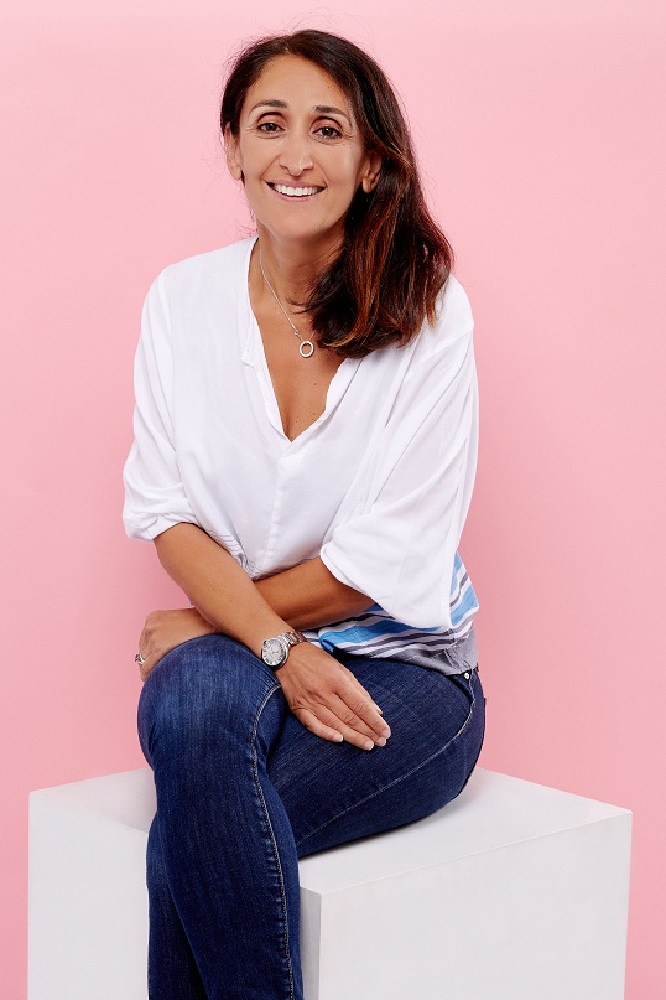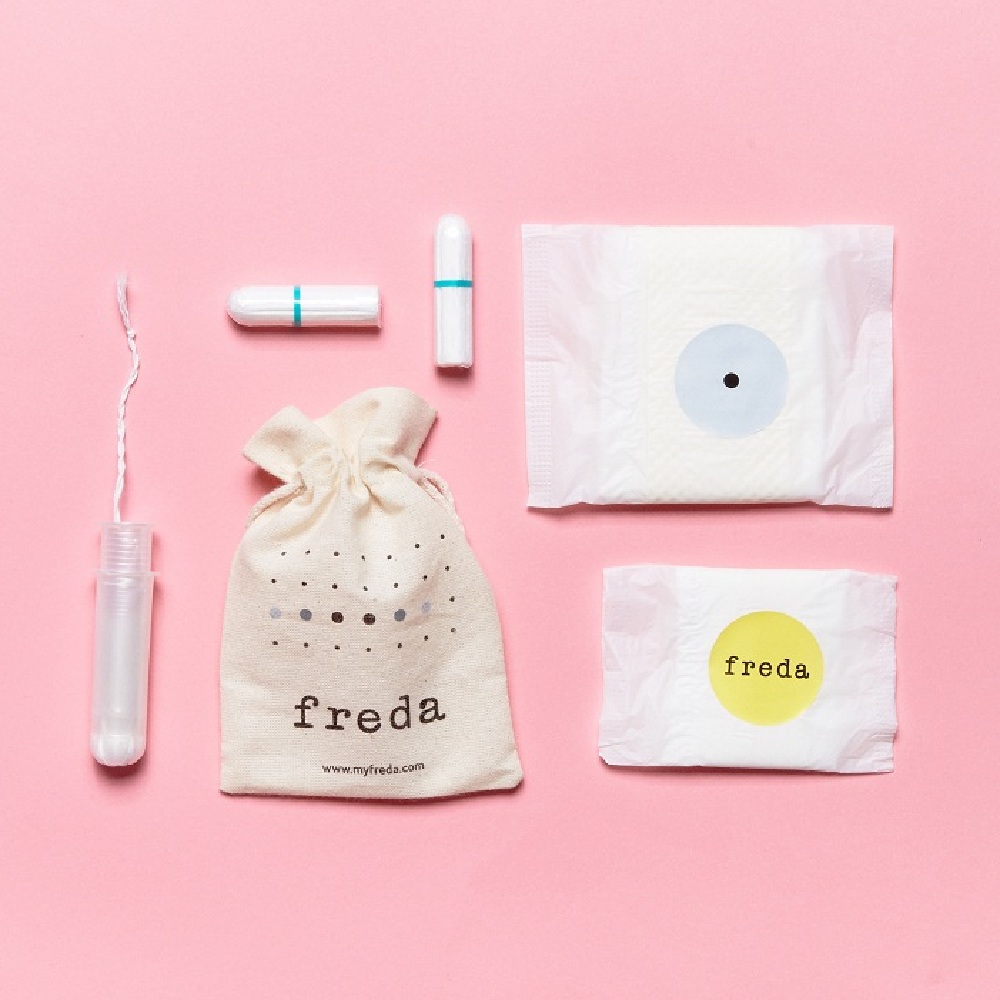Launching today- Freda is the first truly organic, eco-friendly period care range that is rebooting femcare for the 21st Century, and is on a mission to de-stigmatise periods and end period poverty. Freda has been created for women by women - and gives back to women as a portion of every purchase is donated to initiatives worldwide tackling period poverty. Freda’s tampons are made of 100% certified organic cotton that are biodegradable, hypoallergenic, and free from harmful chemicals and synthetic fibres commonly found in some big brand tampons, whilst their pads contain 100% eco-friendly, biodegradable materials. Freda allows you to select your own combination of products based on your period and uses artificial intelligence to predict your start date and sync the delivery of products to ensure they arrive a few days before your cycle. We caught up with Freda founder Affi Parvizi-Wayne to talk about all things period.

Affi Parvizi-Wayne
Why do you think periods are still taboo in 2018?
The stigma around menstruation is intrinsically linked to sexism. Periods are seen as a sign of women’s sexuality, which is inherently sinful traditionally. Even the use of the word ‘sanitary’ to describe pads and tampons implies that periods are dirty, which is why we’ve coined the term ‘period care’. As progress is made in the movement towards women’s equality, this way of thinking will necessarily be challenged.
For periods to shed their negative association, it’s important that they’re recognised as a normal, healthy process. The inclusion of pads and tampons in hotels, gyms, offices, schools, refugee camps… it all helps towards normalising what is a natural process, and these are practical steps we can take.
Why does femcare need rebooting this year?
Femcare brands have long benefitted from the societal silence when it comes to periods – they are not legally obliged to disclose the ingredients they put in their products, so many have cut corners and kept costs down by adding unnecessary dyes, gels, and foams. These cheap products are then marketed to us patronisingly – we know how they work, this doesn’t need to be demonstrated! And I don’t need to be shown a woman roller-skating or dancing in white jeans to show the protection a product provides – these absorbency standards are closely regulated, and anyway, all I may want to do on my period is watch TV on the couch.
So Freda isn’t prescriptive – we’re provide natural products that work, right when you need them, and then it’s up to you how you live your period, as it were.
What difference does it make when sanitary products are organic?
In terms of protection, absolutely none – these products are just as effective and reliable as those on the shelves of pharmacies and supermarkets.
Comfort-wise, many of our customers have fed back to us that they prefer organic, and that our products feel smoother and more luxurious than what they’re used to.
And then obviously, environmentally, going organic makes a huge difference. Our products are biodegradable and are therefore a viable option for women interested in sustainable period care.
What sort of chemicals can be found in non-organic sanitary products and what harm to they pose?
Rayon, polyester, chemicals, dioxins, pesticides, polyethylene, polyproprylene – chemicals I hadn’t even heard of when I began looking into it. We know what’s in our food, moisturiser, detergent, so why not the most intimate product we use?
We don’t aim to scare-monger or preach, just to provide another option – cotton is the most absorbent natural material, so that’s all we use in our tampons, while our pads are entirely eco-friendly.
What is period poverty and why is it so important to tackle this problem?
In the UK and around the world, young girls are missing school every month because they can’t afford period products and are therefore forced to stay at home in order to avoid leaking, and the embarrassment and shame that comes along with it. In 2018, this isn’t acceptable – it’s yet another way girls are at a disadvantage.
Why is one product never enough for a woman’s time of the month?
Every women’s period is different, so Freda provides the option to customise your own combination of products and absorbencies that works for you. You may need super tampons some days and regular on others, with a couple of night pads thrown in – you know best, and you shouldn’t have to buy multiple boxes of products and end up with an excess in order to get what you need.

What makes Freda such a unique product?
Our own-brand pads and tampons are designed with sustainability, protection and comfort in mind, and then we comes to access – our product is easily accessible in that it’s delivered through your letterbox every month or provided by your workplace, gym or school, and our giveback pledge ensures that those who can’t afford them can access the products they need too.
What happens to other sanitary products when they are disposed of and what does the biodegradable feature mean for Freda?
Used pads and tampons remain sitting in landfills for years, and this waste is added to everyday – women just keep having periods! The fact that our products are biodegradable means that they’re sustainable and have no such negative impact on the environment, which is crucial given how many of these products a woman will use in her lifetime.
Why was it important that this product was created by women for women?
As a woman, it was important for me that Freda was created with real women in mind, not a distant demographic that’s marketed towards by businessmen in boardrooms. We see ourselves as more than just our product range – we want to be a gathering place for conscious women who want to change the way societies sees periods and, by extension, women.
What is next for you?
We’re relaunching our website this month so we’re really excited for this next chapter. We’ve been able to adapt it to feedback from our amazingly supportive customers, which has been super helpful for us. This will contain our new ‘period calculator’, devised with leading gynaecologists, which will enable us to sync our delivery to your cycle, ensuring that you always have what you need when you need it.
Ultimately, our main aim is to improve access to period products – whether in the developing world, or simply for these products to be available freely in office bathrooms, gym changing rooms and hotel rooms. After all, we’re not expected to bring our own loo roll around, so why are we with tampons? Our goal is to get to a place where they’re provided in public spaces. We hope that this will contribute to ending the taboo around periods! Finally

